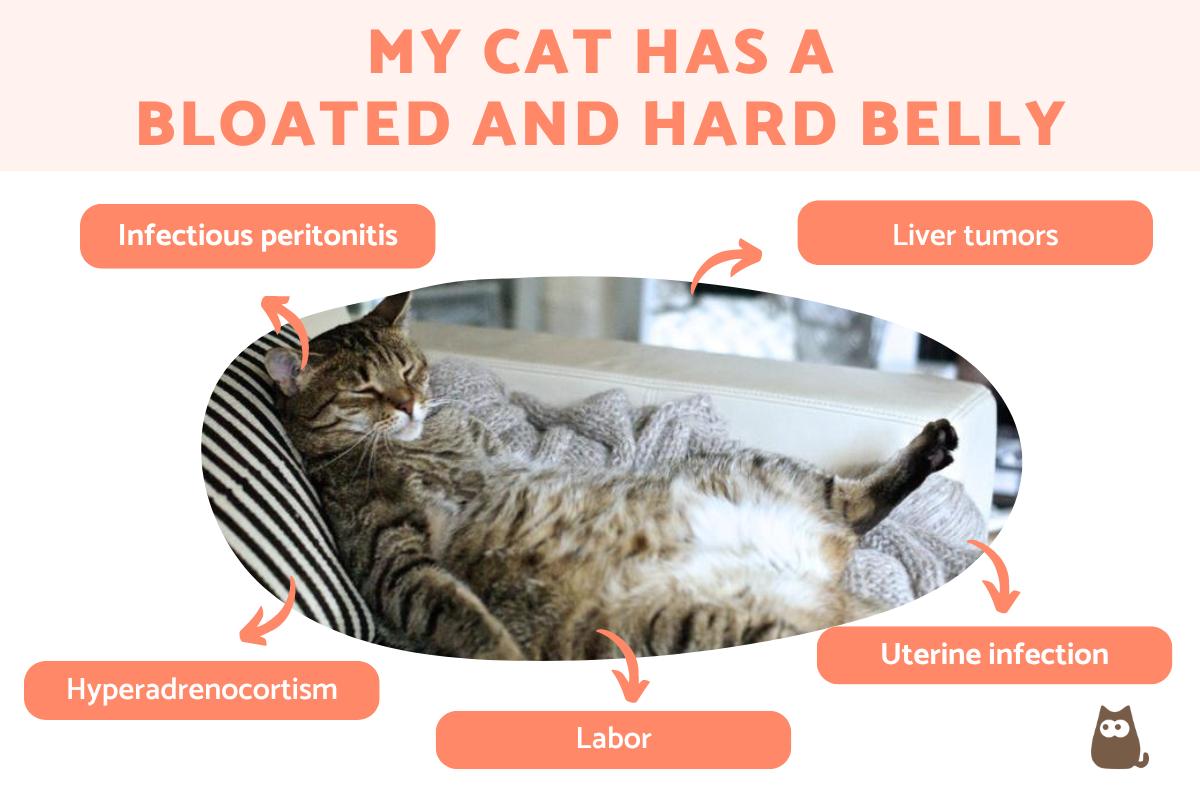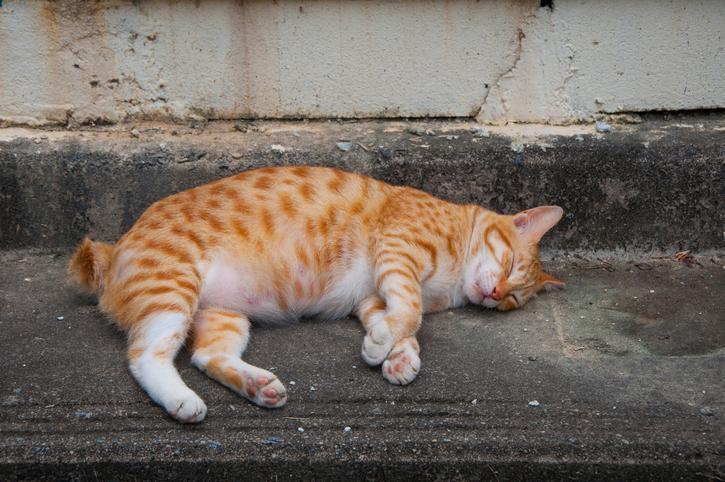My Cat's Stomach Is Bloated and Hard



See files for Cats
We may not notice our cat has a bloated and hard belly until the problem has progressed. This is because cats do not often like their bellies being touched. Their undersides are sensitive since many of their vital organs are located in this vulnerable region. Such vulnerability is also the reason why we cannot ignore these symptoms. Swelling and changes in tissue texture can be evidence of various health conditions which can threaten the health of the cat. In these cases, we need to take the cat to a veterinarian immediately if we see that my cat's stomach is bloated and hard. AnimalWised explains the causes of cat hard belly and what can be done to treat these issues.
My kitten has a swollen belly
Due to their lack of developed immunity, a swollen kitten belly is particularly worrying. They are more vulnerable to disease and infection than an adult cat. Perhaps the most common cause of a hard or swollen belly in kittens is internal parasites. If you pick up a kitten which has intestinal parasites, you may be able to see they have a distended abdomen that appears bloated and hard.
A kitten will be infested with parasites in one of two main ways. Firstly, their environment may not be hygienic, allowing parasites to proliferate. For this reason, we need to ensure the nest where the mother gives birth is clean and other animals are prevented from entering. This should continue until the kittens are fully weaned. The other way kittens may become infested is due to parasites coming from the mother during feeding. It is possible the mother will be asymptomatic, but the vulnerable kittens are unable to fight them off.
If we suspect a kitten's abdominal swelling is due to internal parasites, we need to take them to the veterinarian immediately. They will be able to perform the correct diagnostic tests to not only confirm the presence of parasites, but to determine which type. Different types of parasite require different treatment methods. After treatment, the veterinarian will also be able to advise us on the proper course of deworming. This should be implemented at the same time as their vaccination schedule.
If your kitten has a swollen belly and also exhibits diarrhea, the extent of the parasite infestation in their digestive system will be considerable. If we see blood or worms in their feces, then immediate action needs to be taken. The vet will likely take a sample of the feces and examine it under a microscope to see what species is causing the parasitosis. Once the type of parasite is identified, they will be able to prescribe the right course of treatment.
You may need to consider that the parasite may not be visible in one single sample, so several samples over alternate days may need to be taken. In any case, a heavy parasitical infestation in kittens is particularly dangerous. The profuse diarrhea dehydrates them and endangers their life.
Lastly, a bloated belly in kittens may not necessarily be a problem. When they feed, their small stature means their abdomen will become distended as it is full of milk. This will reduce as their metabolize their food. In this case, the belly will be temporarily bloated, but it will not be hard.
Ascites in cats
Ascites is the medical term for certain types of abnormal fluid accumulation in the abdominal cavity. There are various causes of ascites, but veterinary examination is required to identify and treat it effectively. Ascites can explain why our cat has a swollen and hard belly, but this is a symptom of another condition. To know the underlying cause of a swollen abdomen in cats, we need to look at the causes of ascites in the following sections.
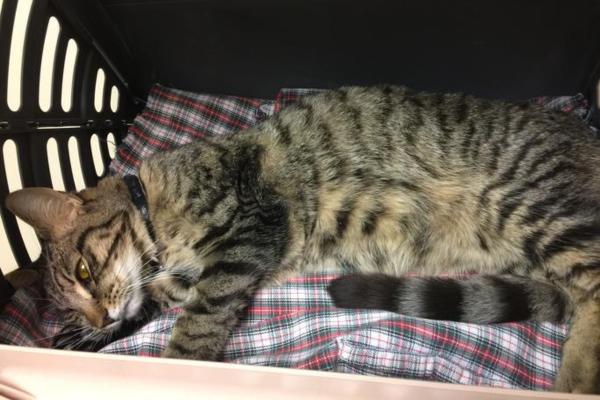
Infectious peritonitis causing hard bellies in cats
Feline infectious peritonitis (FIP) is one of the most serious diseases which can cause a cat's belly to swell and harden. It is a viral pathology which causes inflammation in the peritoneum, the membrane which lines the inside of the abdomen. This is related to the feline coronavirus as it is a mutation of feline enteric coronavirus.
FIP can also affect certain organs such as the liver or kidneys. As is the nature of a virus, it is very difficult to treat the infection directly. Instead, the symptoms are treated and the immune system is boosted in order to fight off the infection. As this disease is so infectious in cats, a vaccine has been created to prevent it.
A cat having a hard belly is not the only symptom which accompanies feline infectious peritonitis. Other symptoms include:
- Chronic fever
- Anorexia
- Weight loss
- Lethargy
- Excessive thirst and urination (if kidneys are affected)
The symptoms will also vary depending on the organs affected by ascites. Respiratory problems can occur if the fluid accumulation affects the lungs, specifically pleural effusion. Jaundice and neurological problems can also manifest if the liver and brain are affected, respectively.
Abdominal inflammation in cats due to liver tumors
The presence of a tumor or tumors in the liver is another cause which may explain why a cat has a bloated and hard belly. This disorder is more common in older cats. In these cases, older felines will usually show other non-specific symptoms, i.e. those which are common to several diseases. Concurrent symptoms usually only occur when the damage is already advanced.
When the cat has abdominal distension due to tumors, the belly area either enlarges or becomes loose and flabby. The tumor is a rigid mass which means the cat's stomach feels hard. We might also see other symptoms such as:
- Anorexia
- Weight loss
- Lethargy
- Increased urination
- Vomiting
Only the vet can give an accurate diagnosis, especially because many of these symptoms also present with various diseases. The prognosis will depend on the individual and whether the tumor is malignant or benign. If it is malign, it means we will be dealing with a type of cancer in cats.
Abdominal inflammation in cats due to hyperadrenocorticism
Although not very common, hyperadrenocorticism could be the root cause of a cat's swollen belly. This disease is also known as Cushing's syndrome and is caused by an excess of glucocorticoid production, usually due to tumors or hyperplasia. It requires veterinary treatment and regular follow-up.
Other symptoms may include:
- Lethargy
- Increased food intake
- Increased water intake
- Increased urination
- Hair loss
- Fragile skin
When hair and skin is affected, it is likely the condition is in an advanced stage and treatment is more difficult. They will also become very weak and frail.
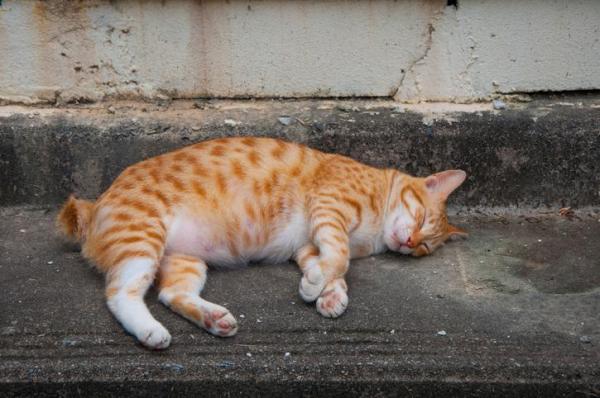
Other reasons for abdominal inflammation in cats
In addition to the causes of a swollen belly already mentioned, there may be some other issues affecting the cat:
- Labor: if a pregnant cat is in labor, the cat will need to use contractions to birth the kittens from the uterus. This can give the impression that the belly has temporarily inflamed.
- Uterine problems: there are infections such as pyometra which cause the uterus to swell. These can be seriously life threatening and need immediate treatment.
- Heart disease: cardiac problems in cats can affect other parts of the feline's organism, resulting in symptoms as disparate as coughing and a bloated and hard stomach. Various types of heart disease in cats can lead to these problems and they all need to be diagnosed by a vet.
- Hypoalbuminemia: this is a rare condition which can cause fluid to leak into the cat's abdomen. It is characterized by very low levels of albumin. It is usually a symptom of liver failure in cats since this is the organ which produces the protein.
- Obesity: of course a cat with an enlarged belly might have a more simplistic cause. In the case of overeating or eating food which is too rich, they may develop obesity. However, you will see they will also put on weight on other parts of the body.
As we said in the introduction, being able to feel your cat's belly to see if it is swollen is not always an easy task. This is why it is so important to look out for related symptoms and to have regular veterinary check ups.

This article is purely informative. AnimalWised does not have the authority to prescribe any veterinary treatment or create a diagnosis. We invite you to take your pet to the veterinarian if they are suffering from any condition or pain.
If you want to read similar articles to My Cat's Stomach Is Bloated and Hard, we recommend you visit our Other health problems category.






 My cat always eats alot. But recently just got really fat. Everything else is still the same. She just cant get arount as easy anymore. I am worried because her little legs wont be able to hold her mutch longer. Im started a treatment for parasites hoping that im doing the right thing and its not anything worse.
My cat always eats alot. But recently just got really fat. Everything else is still the same. She just cant get arount as easy anymore. I am worried because her little legs wont be able to hold her mutch longer. Im started a treatment for parasites hoping that im doing the right thing and its not anything worse. 

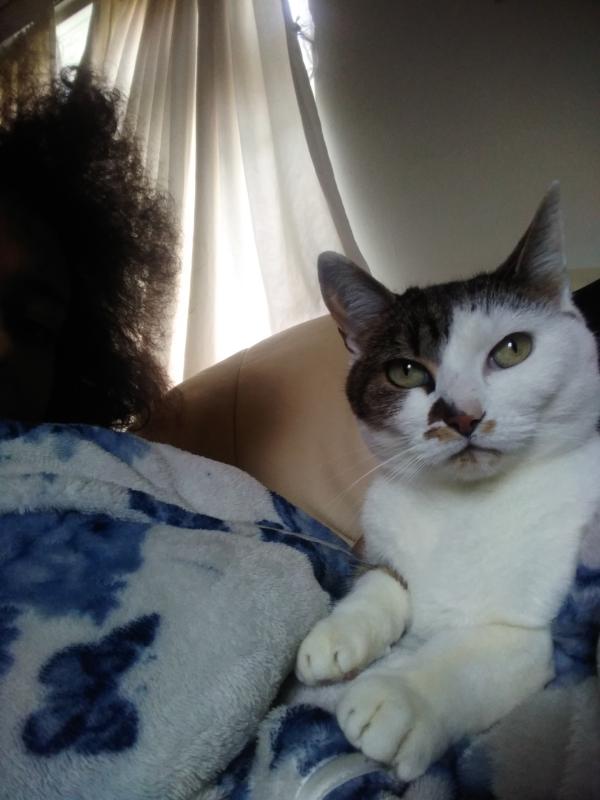 My vets they don't notice her swollen belly say theres no problem but I notice there is a problem,there not doing much about it really she looked like this for a long time since a kitten she's now 6 years old.
My vets they don't notice her swollen belly say theres no problem but I notice there is a problem,there not doing much about it really she looked like this for a long time since a kitten she's now 6 years old.
